SRMAP Departmental Events
- Panel Discussion on Union Budget 2022-2023 February 7, 2022
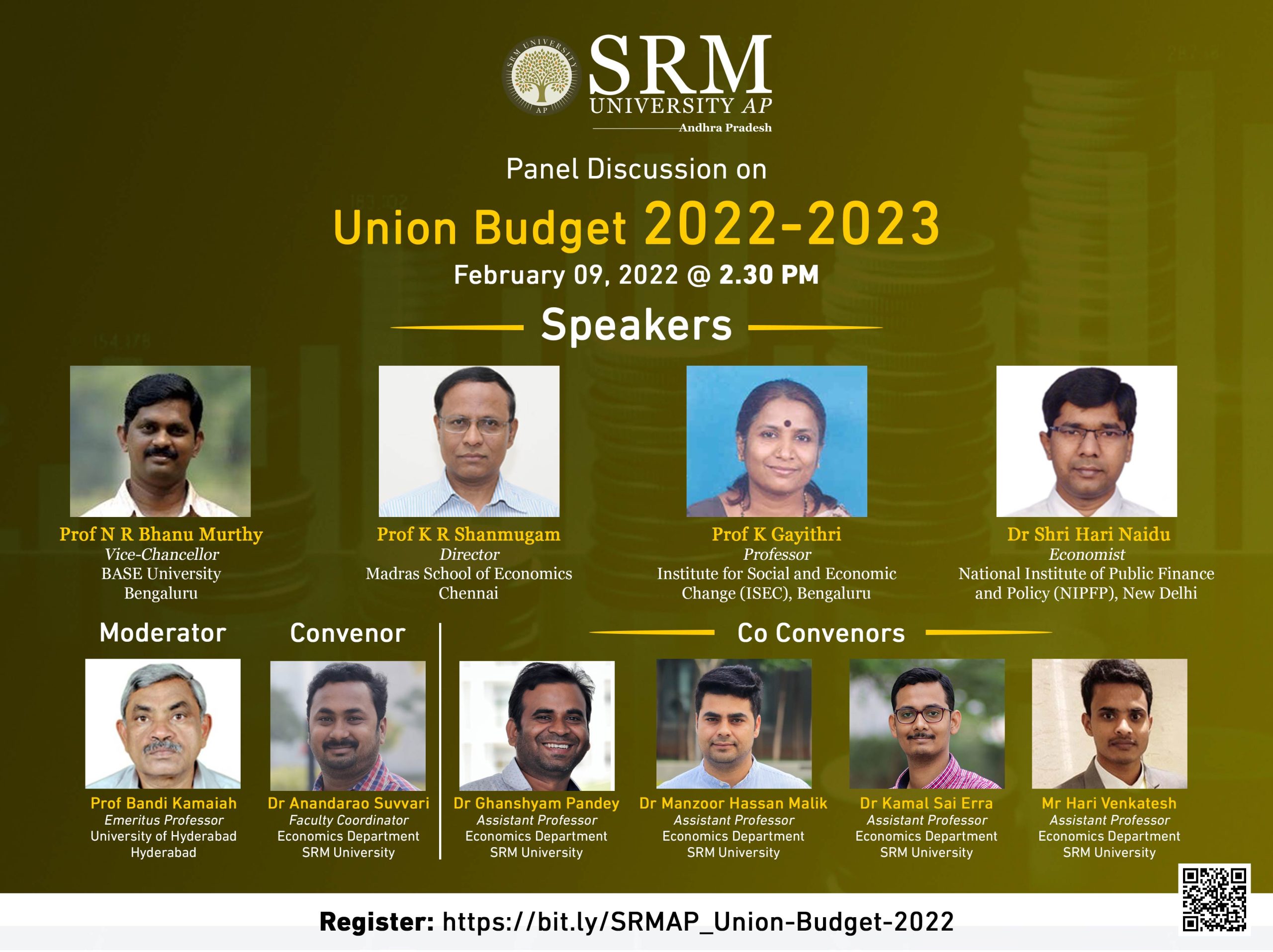 The department of Economics is bringing forth a panel of economists to discuss the implications of the Union Budget 2022-2023. The panel will confer upon the vision of the new budget and its impact on our society.
The department of Economics is bringing forth a panel of economists to discuss the implications of the Union Budget 2022-2023. The panel will confer upon the vision of the new budget and its impact on our society.Date: February 09, 2022 (Wednesday)
Time: 2.30 pm IST
The Speakers List
- Prof N R Bhanu Murthy, Vice-Chancellor, BASE University, Bengaluru
- Prof K R Shanmugam, Director, Madras School of Economics, Chennai
- Prof K Gayithri, Professor, Institute for Social and Economic Change (ISEC), Bengaluru
- Dr Shri Hari Naidu, Economist, National Institute of Public Finance and Policy (NIPFP), New Delhi
Moderator
- Prof Bandi Kamaiah, Emeritus Professor, University of Hyderabad
Convenor of the Event
- Dr Anandarao Suvvari, Faculty Coordinator, Economics Department, SRM University-AP
Co-Convenors of the Event
- Dr Ghanshyam Pandey, Assistant Professor, Economics Department, SRM University-AP
- Dr Manzoor Hassan Malik, Assistant Professor, Economics Department, SRM University-AP
- Dr Kamal Sai Erra, Assistant Professor, Economics Department, SRM University-AP
- Mr Hari Venkatesh, Assistant Professor, Economics Department, SRM University-AP
Join the session to learn more about how the Union Budget 2022-2023 will affect you along with the rest of the country.
Continue reading → - On prospective memory and aging in medical adherence January 25, 2022
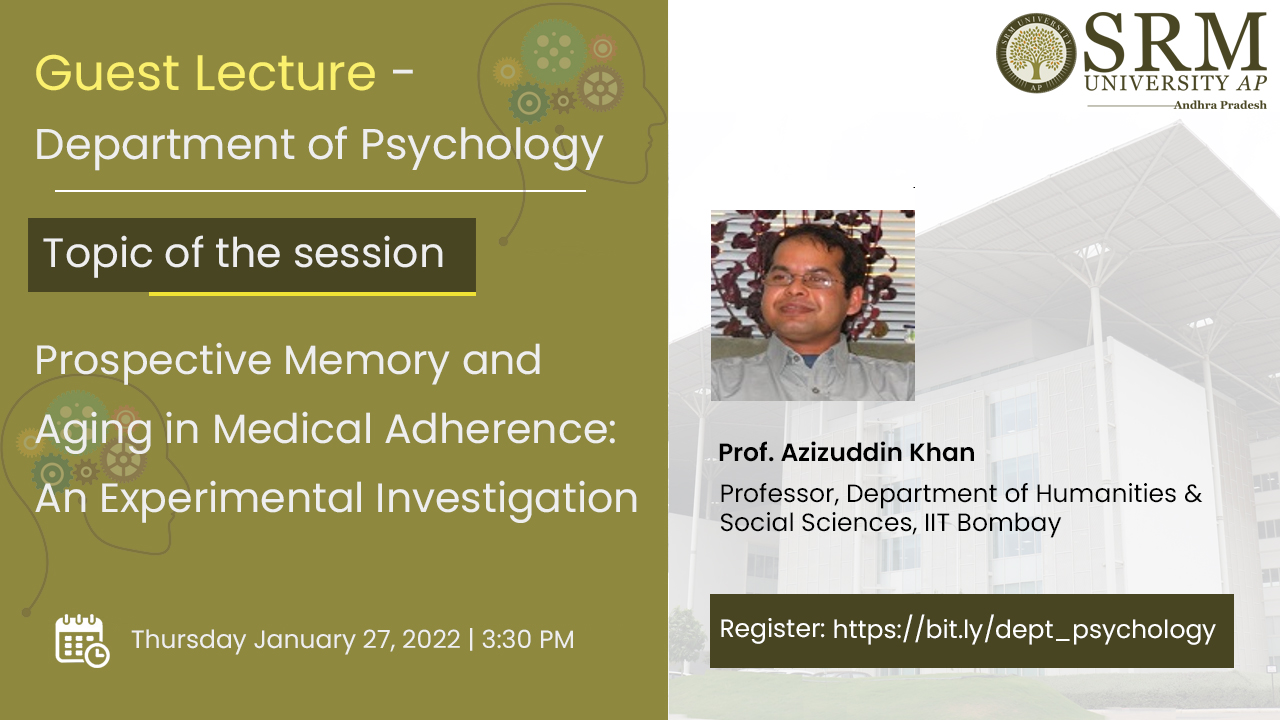 The Department of Psychology is organising a guest lecture on the topic “Prospective Memory and Aging in Medical Adherence: An Experimental Investigation”. Prof Azizuddin Khan, Professor at the Department of Humanities & Social Sciences, IIT Bombay will engage the audience on Thursday, January 27, 2022, from 03.30 to 04.30 pm.
The Department of Psychology is organising a guest lecture on the topic “Prospective Memory and Aging in Medical Adherence: An Experimental Investigation”. Prof Azizuddin Khan, Professor at the Department of Humanities & Social Sciences, IIT Bombay will engage the audience on Thursday, January 27, 2022, from 03.30 to 04.30 pm.There are several studies happening across the world regarding implications of theoretical models and empirical findings associated with laboratory studies of prospective memory for medication adherence behaviours. Memory is a fickle thing; it changes as we age. Learn more by joining this session on January 27, 2022, at 3.30 pm.
About the Speaker
Dr Azizuddin Khan is currently a Professor in Psychophysiology and Cognitive Psychology at the Department of Humanities and Social Sciences at the Indian Institute of Technology Bombay (IITB). He is heading Psychophysiology Laboratory. He was visiting faculty at the Department of Psychology, University of Jyvaskyla, Finland from August 2004 – December 2005, Aligarh Muslim University Aligarh, India 2015-17, Department of Psychology, University of Warsaw, Poland 2018. He has research interests in the field of Environmental Psychology, Polar Research, Developmental Neuropsychology, emotion regulation, Prospective Memory, and Developmental Dyslexia by using biofeedback and electrophysiological method. While teaching interest lies in the fields are Cognitive Psychology, Educational Psychology, Human Cognitive Processes, Developmental Neuropsychology, Biological Psychology, Cognitive Ergonomics and Research Methodology Dr Khan has done his graduation and post-graduation from Aligarh Muslim University, (AMU) Aligarh with first division in 1993 and 1995 respectively. He has qualified UGC- NET, Junior Research Fellowship in December 1998, conducted by University Grant Commission, New Delhi. He has completed his PhD from IIT Kanpur on the topic of “Temporal Aspects of Prospective and Retrospective Memory” in 2006. He has also worked as a researcher at the Department of Psychology, University of Jyvskyla, Finland, from August 2004 to March 2005. Dr Khan is an eminent psychologist, prolific writer and author of many books. He is recipient several visiting researcher fellowships such as Hermes Fellowship, DAAD, INSA, EMINTE, ICSSR etc. Dr Khan has published more than 4 dozen peer-reviewed international journals especially in the field of emotion regulation and developmental disorders.
Continue reading → - Some Fascinating Features of Water Wave Propagation and Dissipation: A Mathematical Viewpoint January 24, 2022
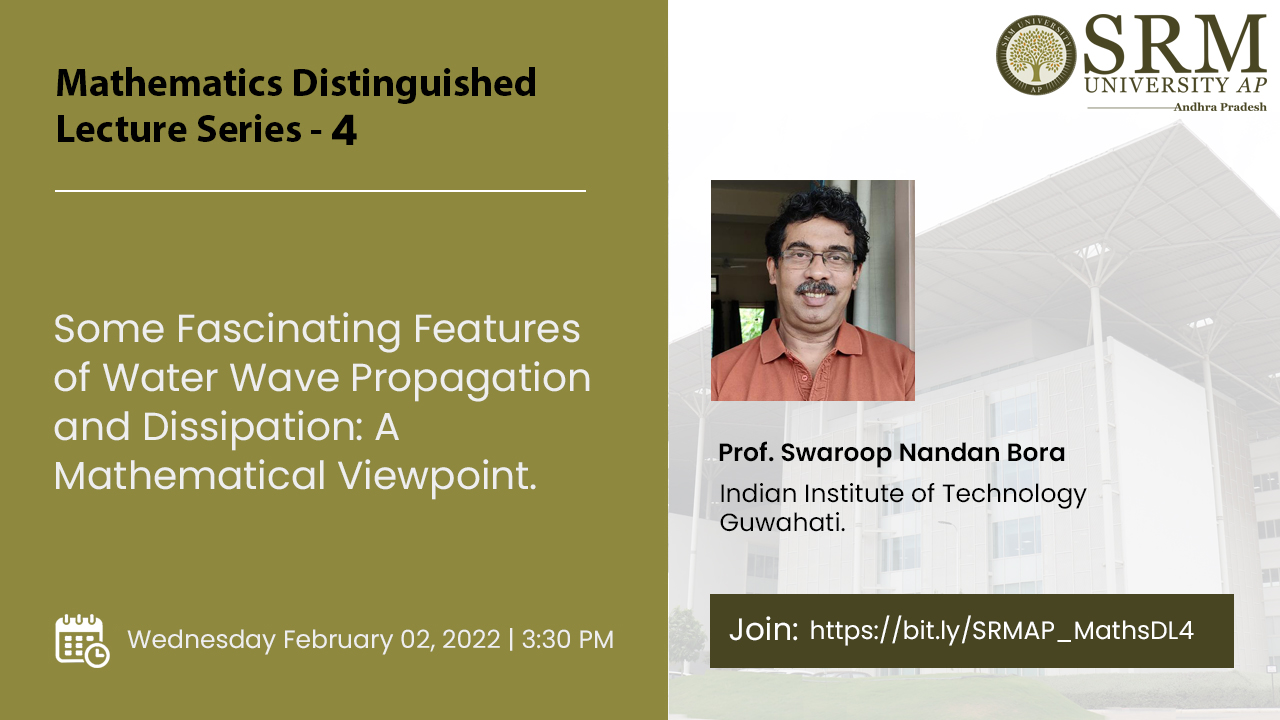 The Department of Mathematics is going to host the fourth instalment of the Distinguished Lecture on February 2, 2022, at 3:30 PM with Prof Swaroop Nandan Bora from the Indian Institute of Technology Guwahati as the keynote speaker. Dr Bora will be speaking on “Some Fascinating Features of Water Wave Propagation and Dissipation: A Mathematical Viewpoint”.
The Department of Mathematics is going to host the fourth instalment of the Distinguished Lecture on February 2, 2022, at 3:30 PM with Prof Swaroop Nandan Bora from the Indian Institute of Technology Guwahati as the keynote speaker. Dr Bora will be speaking on “Some Fascinating Features of Water Wave Propagation and Dissipation: A Mathematical Viewpoint”.Prof Swaroop Nandan Bora received his PhD in Mathematics from Dalhousie University in Halifax, Canada. He joined the Department of Mathematics, Indian Institute of Technology Guwahati in 1999. He is also the youngest son of the renowned novelist and Padma Shri recipient Lakshmi Nandan Bora.
Prof Bora’s research interest includes Water Wave Mechanics, River Mechanics, Sloshing Dynamics, Flow through Porous Media, Differential Equation, Fractional Differential Equation. He has been elected to don the cap of the President of the Indian Society of Theoretical and Applied Mechanics (ISTAM).
Some Fascinating Features of Water Wave Propagation and Dissipation: A Mathematical Viewpoint:
Long since oceans have been serving mankind in various ways and of course, at the same time, the waves have also shown their fury at times by claiming lives and creating huge destruction. In order to understand the oceans and the strength they display through waves, it becomes very pertinent to study ocean waves, their behaviour and effects with respect to wave propagation, scattering, damping, trapping etc., which influence a number of issues in connection with marine structures and coastal regions. The comfortable situation to work with ocean waves is by considering simple conditions thereby neglecting many important aspects such as the porosity of the structures that are installed in the ocean for various activities, the porous and elastic effects of the sea-bed and also the unevenness of the sea-bed. However, the real situation demands that some or all of these be taken into account while modelling a problem so that the problem is formulated for a more realistic scenario.
In order to reduce the wave impact on marine structures (i.e., to dissipate the wave effects), it is essential that the structures (such as cylinders, barriers, caissons) possess in them the ability to reflect the wave and help in attenuating the wave energy. This brings into fore the utility of porous structures which can be used as breakwaters in the coastal and offshore regions for various applications. Further, it is practically impossible to find sea-beds that are flat and do not possess any porosity or elasticity. In other words, a more realistic formulation can be carried out by considering structures possessing porosity, and sea-beds being uneven and possessing porosity and/or elasticity.
The objective of this talk is to discuss the scattering of water waves by various types of porous structures placed on flat or uneven sea-bed which may possess porosity and/or elasticity. The study focuses on how reflection varies when different important parameters are changed. The observations made from this study will allow one to design structures that will be effective enough to reduce wave impact on the structures. In this talk, some results will be displayed which portray the physical scenario. An attempt will be made to present some practical problems which take into account a number of important properties and parameters so that the results become practical to be followed by relevant people for various activities with regard to protecting certain regions and structures from harsh ocean wave action. It will mainly emphasize the significant role that porosity and elasticity play with regard to ocean wave propagation and various related issues. The emphasis will be on the modelling of the problems which will establish the essence of mathematics.
A brief and friendly introduction to water wave propagation will precede the main components of the talk to give some general idea to the audience.
Join the exciting Lecture on February 2, 2022, at 3:30 PM with Prof Swaroop Nandan Bora.
Continue reading → - Ms Mallarapu Tanoogna shares her experience January 22, 2022
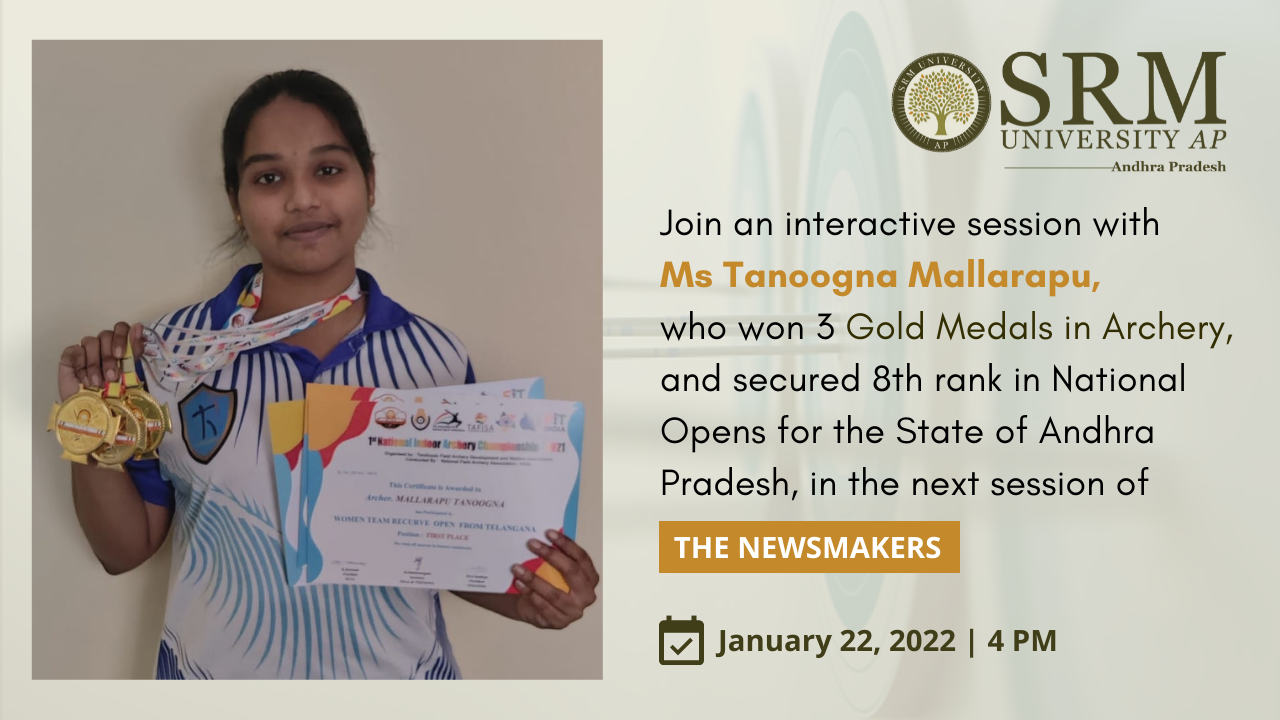 Ms Mallarapu Tanoogna, a third-year Civil Engineering student at SRM University – AP, has excelled at National Indoor Archery Championship-2021, winning three gold medals and finishing 8th in the National Open Ranking representing Andhra Pradesh. The Department of Student Affairs hosts The Newsmaker session with Ms Tanoogna on January 22, 2022, from 4.00 pm to 5.00 pm.
Ms Mallarapu Tanoogna, a third-year Civil Engineering student at SRM University – AP, has excelled at National Indoor Archery Championship-2021, winning three gold medals and finishing 8th in the National Open Ranking representing Andhra Pradesh. The Department of Student Affairs hosts The Newsmaker session with Ms Tanoogna on January 22, 2022, from 4.00 pm to 5.00 pm.Ms Tanoogna has been training to participate in indoor and outdoor archery championships for a year. She won gold medals in the Senior Recurve women individual, women team and mixed team categories and is ranked 8th in the national archery rankings.
All are encouraged to join the session and get inspired by the champion!
Continue reading → - Eminent Lecture Series with Prof Haribabu Ejnavarzala December 21, 2021
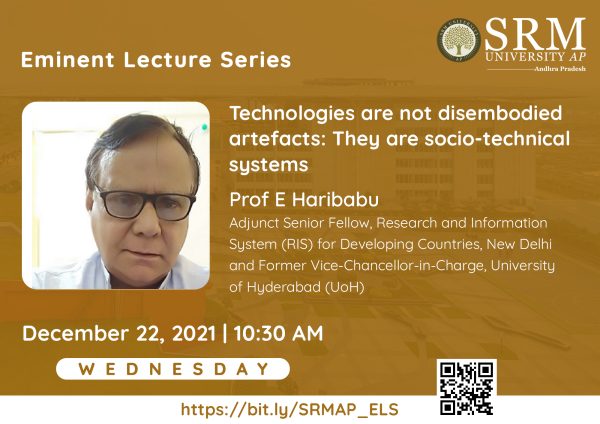 Technology is deeply integrated into the human society. The Department of Management Studies invites you all to the Eminent Lecture Series with our guest Prof Haribabu Ejnavarzala, for an engaging session on the economic, social, and other impacts of new technology on our lives.
Technology is deeply integrated into the human society. The Department of Management Studies invites you all to the Eminent Lecture Series with our guest Prof Haribabu Ejnavarzala, for an engaging session on the economic, social, and other impacts of new technology on our lives.Topic: Technologies are not disembodied artefacts: They are socio-technical systems
Date: December 22, 2021
Time: 10.30 am IST
About the Speaker:
Prof Haribabu Ejnavarzala is an Adjunct Senior Fellow, Research, and Information System (RIS) for Developing Countries, New Delhi and Former Vice-Chancellor-in-Charge, University of Hyderabad (UoH).
Abstract:
Technologies are socio-technical systems. The forces that shape the development of technology are social, economic, cultural, political, and ethical in nature. A technology introduced into society has consequences for interrelated domains -social (class, caste, gender relations), economic, political, cultural, and ethical. Technologies also affect the environment- water, soil, air, and non-human forms of life. In other words, technologies are embedded in societal and environmental contexts. In order to understand the values and interests underlying the construction of technological innovation and its consequences, we have to unpack the design of a given technology and its associated practices. Technologies are intricately related to the interests and meaning structures of stakeholders. In this lecture, I focus on genetic modification of crops to show that it is a socio-technical system deeply connected with interests, sometimes conflicting interests, and meanings of relevant stakeholders – farmers who use the technology, consumers of products produced by genetic modification of crops, government, regulatory agencies, judiciary, and civil society organisations in the Indian context. In conclusion, I argue that innovations that promote equity, inclusivity and justice will have more significant social acceptability.
Please join this spirited session with our eminent guest on December 22, 2021, at 10.30 am IST for the next edition of Eminent Lecture Series.
Continue reading →

